THE OUTLIER
Why Joburg has worsening water issues — even when the dams are full
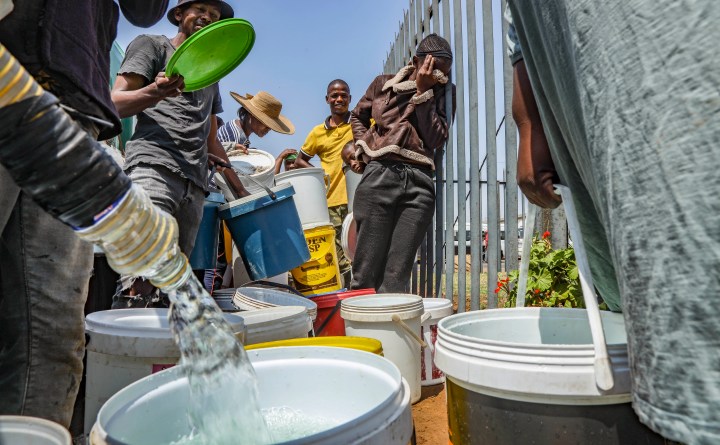
As several Joburg suburbs experience water shortages, The Outlier unpacks why this is when the dams supplying the city are full.
The City of Joburg’s water use has increased by 11% in the past five years, from 557-million to 615-million kilolitres a year.
Why does that matter? There is a cap on the amount Rand Water can supply to Joburg and other municipalities of 1.6-billion kilolitres. Joburg currently uses 38% of that allocation — about a third of the population of Gauteng lives there.
The rest of the water is distributed to 11 other municipalities: Ekurhuleni, Tshwane, Rand West, Mogale City, Merafong, Emfuleni and Midvaal in Gauteng, as well as Rustenburg in North West, Metsimaholo in the Free State and Govan Mbeki and Thembisile Hani in Mpumalanga. Sasol and Eskom also get a share.
If Joburg’s water usage continues to increase at a rate of 11% every five years, it will need 43% of Rand Water’s allocation by 2027. For it to get that, all the other municipalities, Eskom and Sasol, will have to use less.
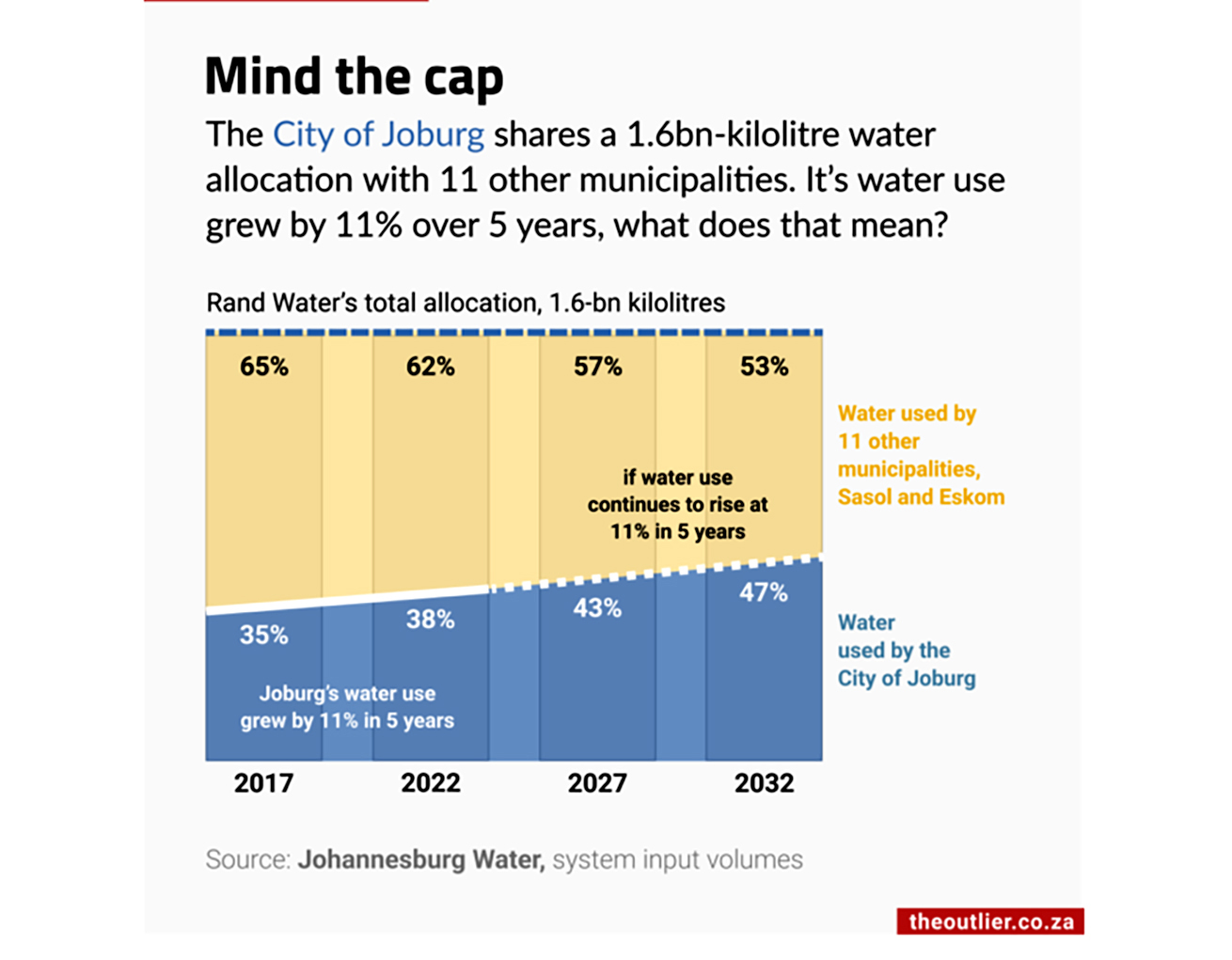
(Graph: the outlier.co.za)
Why is there a cap on the water supply?
Unlike most cities in the world, Joburg is not situated on a major river. Gauteng gets its water from a network of 14 dams called the Integrated Vaal River System. The Lesotho Highlands Water Project is a key part of this system with its dams Katse and Mohale supplying South Africa’s economic hub with water.
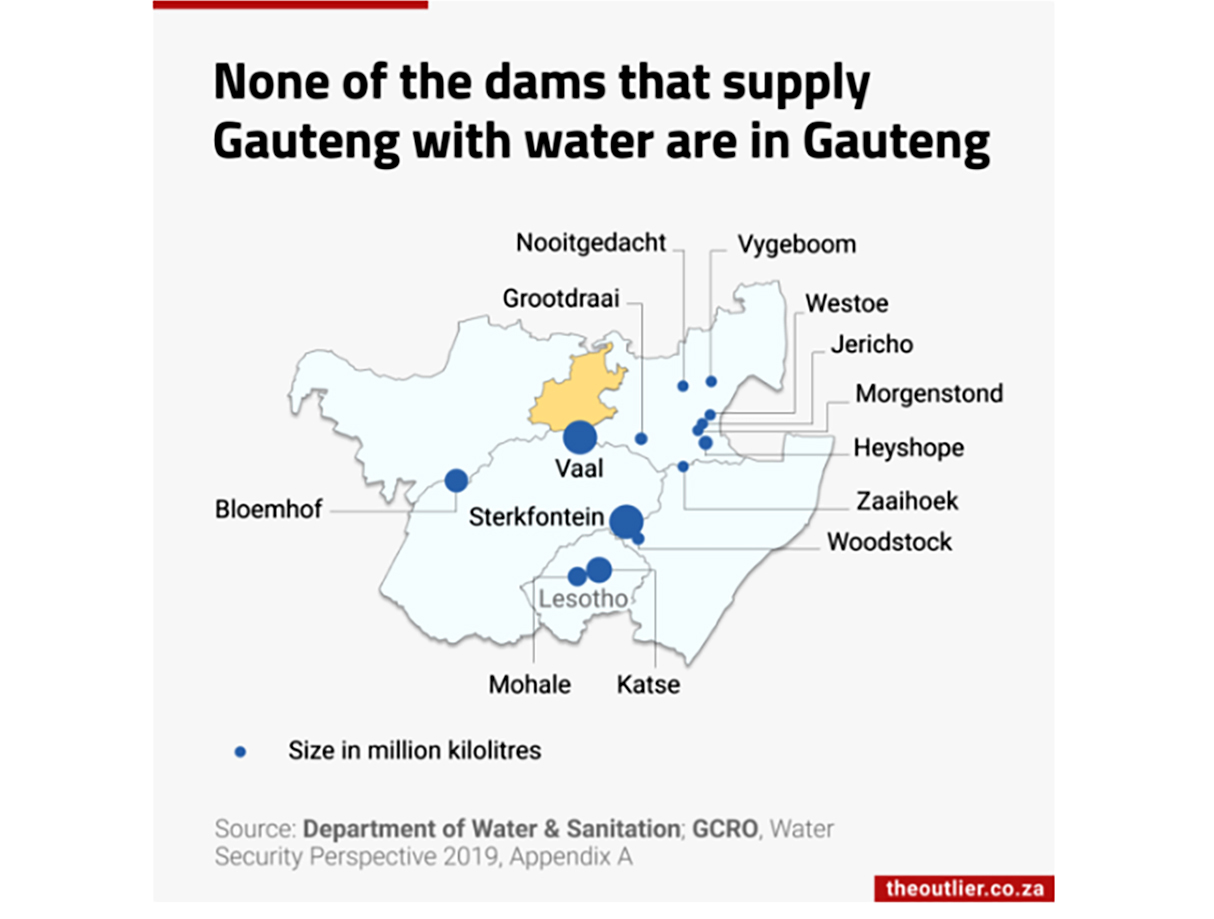
(Graph: the outlier.co.za)
Rand Water is currently licensed to withdraw 1.6-billion kilolitres from the Vaal River System. The cap exists to maintain water supply for municipalities and industries in the event of a multi-year drought — which means if everyone uses their water responsibly, there should never be a day zero for Joburg.
Rand Water’s allocation will only be increased when Phase II of the Lesotho Highlands Water Project is completed. This will add 2.325-million kilolitres of water storage capacity with the construction of the Polihali Dam in Lesotho.
Phase II was meant to be completed by 2018, but Mabasia Ntoi, the public relations officer for the Lesotho Highlands project, told The Outlier that the project is expected to be commissioned only in 2028.
Less water for the people
Until Phase II is completed, Gauteng’s residents will have to make do with Rand Water’s allocation. At present, there are around 270 litres of water per person per day, based on current population estimates. The Gauteng City-Region Observatory estimates that this will decrease to 220 litres per day by 2028 as the number of people in the province increases.
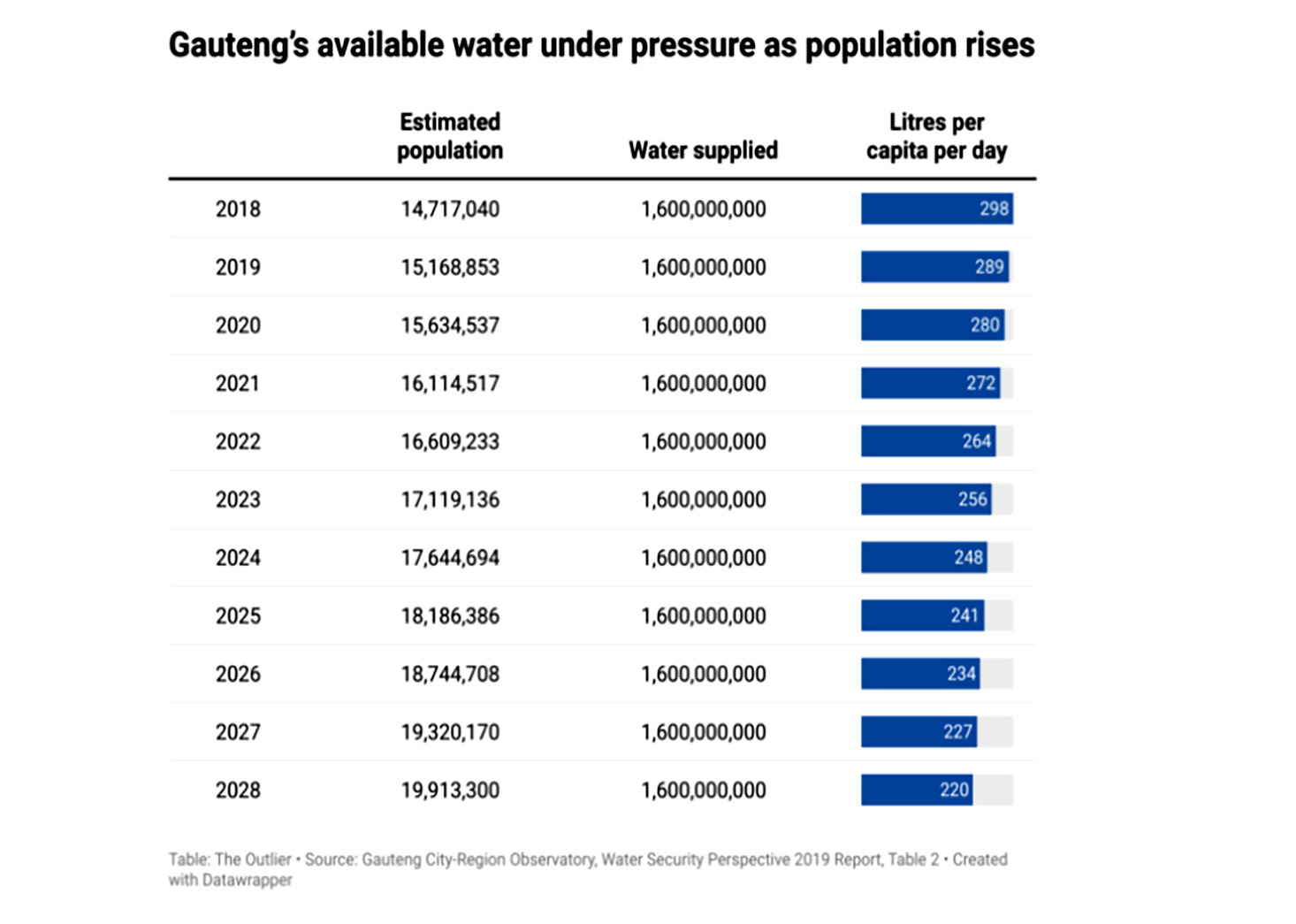
(Graph: the outlier.co.za)
Visit Daily Maverick’s home page for more news, analysis and investigations
Parts of Joburg are already battling with water supply. Why?
Last year, a number of suburbs around Johannesburg experienced water cuts during September and October, even though the dams that supply the Integrated Vaal River System were all full. The situation remains the same today, even though affected suburbs may be different.
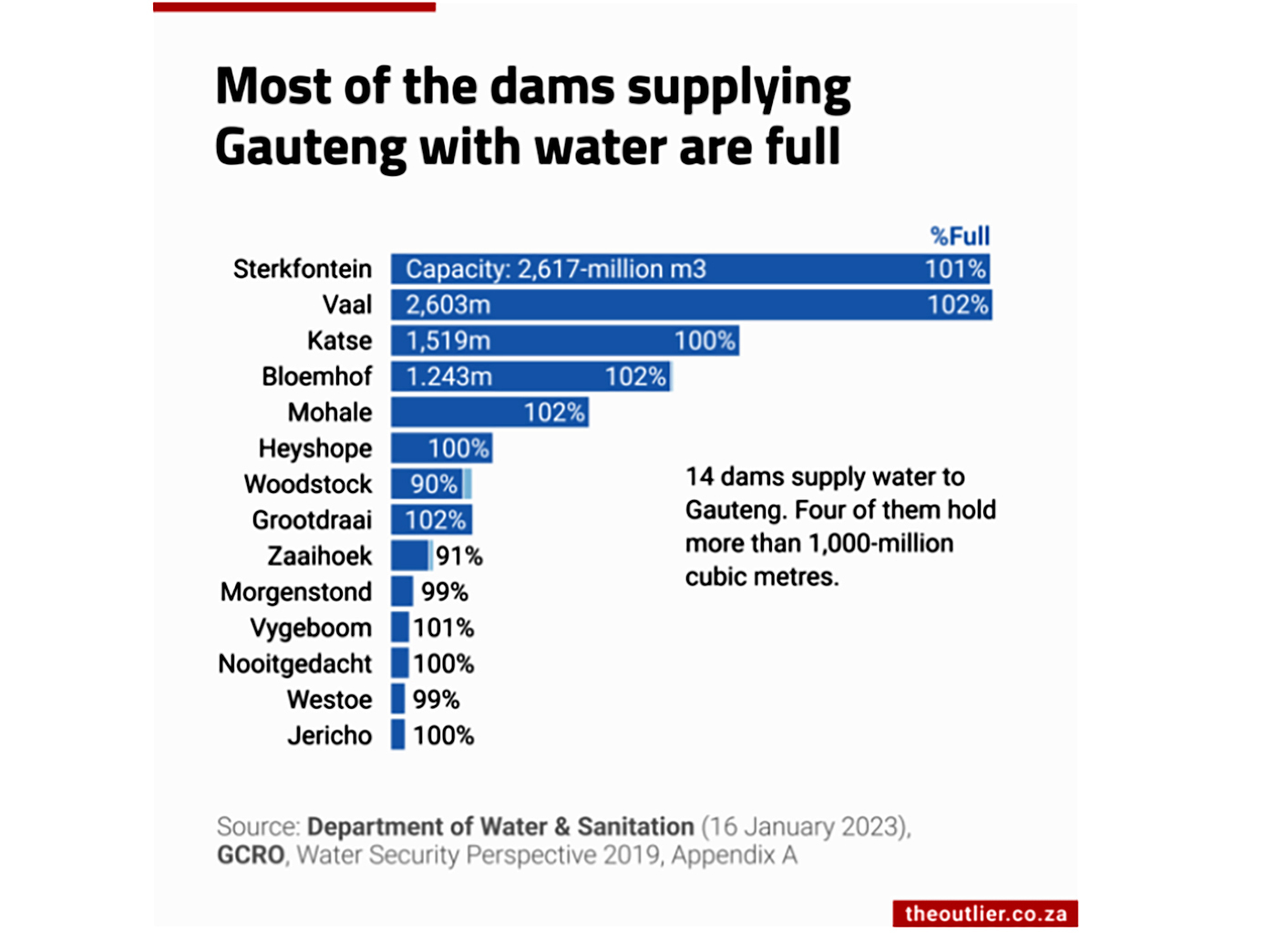
(Graph: the outlier.co.za)
Joburg Water reported low pressure and sometimes no water in the south, centre and western parts of the city between late September and October.
Ageing infrastructure in need of maintenance and power outages were at the root of the problem, rather than a shortage of water.
We read every media release published by Joburg Water between 20 September and 15 November 2022 to find out which suburbs were affected and why.
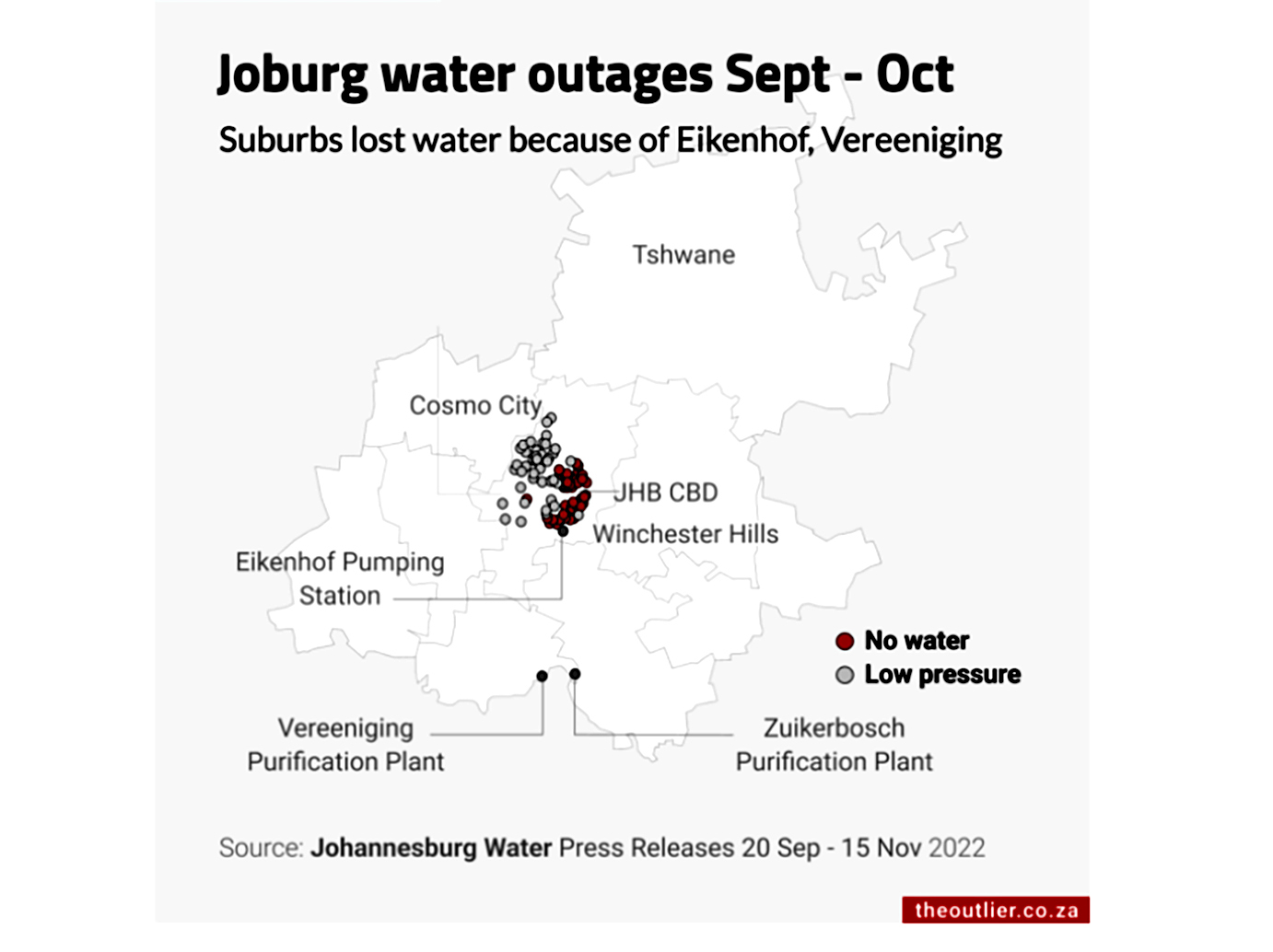
(Graph: the outlier.co.za)
The worst affected suburbs extended from Melville and Parktown to Parkview and Craighall. These suburbs are supplied by the Brixton, Hurst Hill and Crosby reservoirs. Joburg Water had to send water tankers to Rahima Moosa Mother and Child Hospital and the Helen Joseph Hospital in early October because of water outages in those areas.
The immediate cause of these outages was a power failure on 23 September at Rand Water’s Vereeniging water works. And then several power and mechanical failures at pumping stations south of Johannesburg.
Vereeniging water works is one of the Vaal system’s oldest stations. It started operating in 1923, and it sends water to the Eikenhof and Zwartkopjes pumping stations which distribute water to the south, west and centre of the city.
When these pumping stations had mechanical and power issues, the water distribution problems were localised in the south, west and centre of the city.
The water outages between November and January this year were not as bad as September and October.
Suburbs have had no water for a few hours because of planned (and unplanned) maintenance, according to Joburg Water’s media releases.
Some parts of the Joburg South, CBD and its surrounding suburbs were without water for a few days because of power outages at water pumping stations resulting in reservoirs reporting critically low levels to no water.
The suburbs near the Brixton and Hursthill reservoirs have continued to face water outages because of power failures as recently as 14 January 2023, which has not been helped by the Eskom’s rolling blackouts. DM/OBP
First published by The Outlier. For more like this subscribe to the newsletter.



















With all the flip-flopping in the city’s leadership, maybe sometime soon we’ll get someone like Mockus from Bogota?:
“When there was a water shortage, Mockus appeared on TV programs taking a shower and turning off the water as he soaped, asking his fellow citizens to do the same. In just two months people were using 14 percent less water, a savings that increased when people realized how much money they were also saving because of economic incentives approved by Mockus; water use is now 40 percent less than before the shortage.”
(For an interesting article about him from Harvard press, search: Harvard Mockus Bogota)